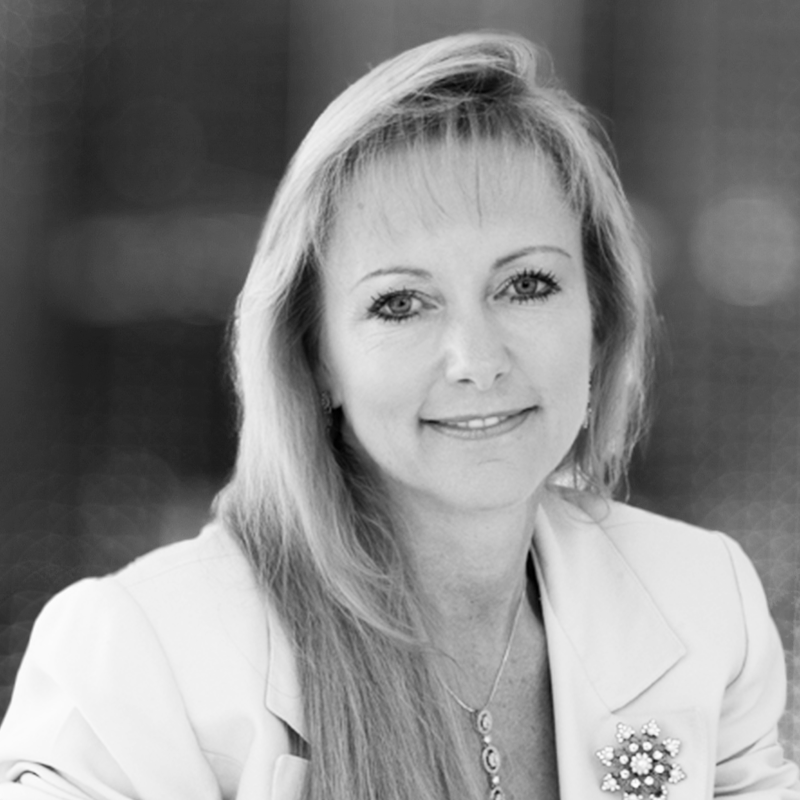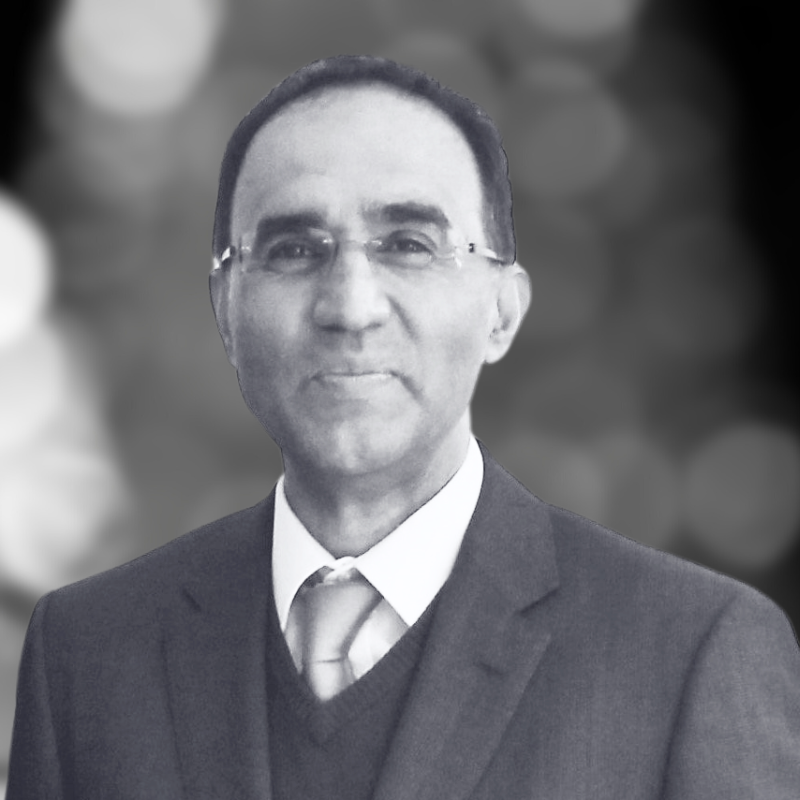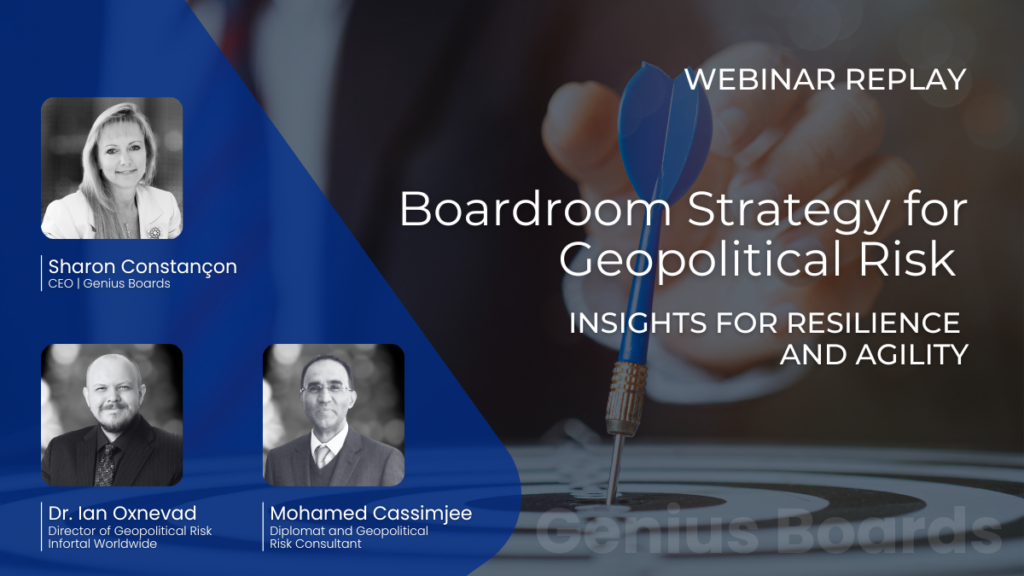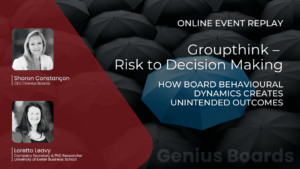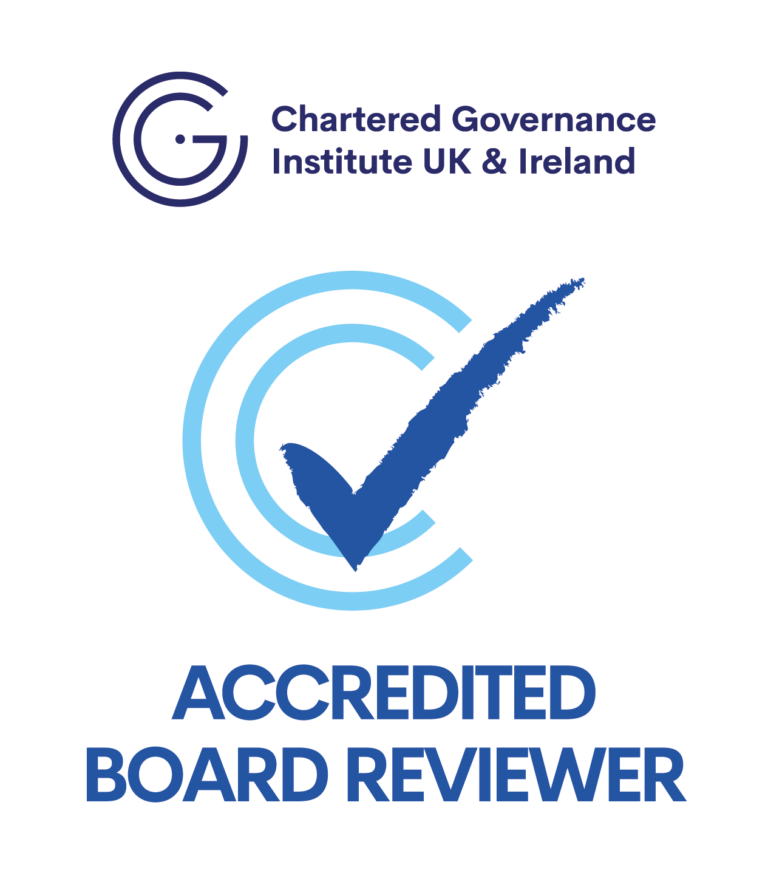In today’s interconnected world, geopolitical events have become one of the most pressing risks for businesses. According to the World Economic Forum (2024), 83% of respondents view geopolitical tensions as the primary threat to global economic growth in the coming year, surpassing even concerns around high inflation and monetary tightening (73%). Looking ahead to the next decade, 86% of participants identify rising geopolitical fragmentation and protectionism as the most significant long-term threat.
With Trump’s recent election as U.S. President, the potential for significant global shifts is higher than ever, and boards must be prepared to anticipate and respond to these emerging risks. This panel discussion, hosted by Sharon Constançon, CEO of Genius Boards, features guest speakers Dr. Ian Oxnevad and Mohamed Cassimjee, who explore how boards should assess, debate, and mitigate geopolitical risks to safeguard their organisations’ resilience and strategic goals.
Listen to the insightful conversation as they explore actionable strategies for helping boards navigate the complexities of a shifting global landscape.
Key Take Aways:
In today’s dynamic geopolitical environment, boards need to navigate the complexities of a rapidly evolving geopolitical landscape. Key topics included the importance of designating intelligence officers, fostering open boardroom dialogue, and understanding global power shifts from a multi-polar perspective.
Sharon Constancon's Background and Expertise
- Sharon shares her extensive experience in the business world, including roles as a chairman, CEO, trustee, and court member.
- She discusses her passion for good governance and boardroom dynamics, highlighting the complexity of managing diverse personalities in boardrooms.
- Sharon introduces the Genius Quotients Model, which maps directors on 11 categories of quotients, including emotional, intelligence, and moral quotients.
- She provides an example of how the model helped resolve conflicts between a finance director and a retail director by identifying their common moral quotient.
The Modern Agenda and Boardroom Dynamics
- Sharon addresses the common pushback from board directors regarding the modern agenda, describing it as a source of frustration and confusion.
- She emphasises the importance of being prepared for unforeseen events, using COVID-19 as an example of a disruptive force that caught many businesses off guard.
- Sharon discusses the need for boards to have open minds and be proactive in addressing potential risks and opportunities.
- She highlights the importance of having robust conversations and scenario planning to mitigate risks and ensure business resilience.
Case Study: Agricultural Company's Challenges
- Sharon addresses the common pushback from board directors regarding the modern agenda, describing it as a source of frustration and confusion.
- She emphasises the importance of being prepared for unforeseen events, using COVID-19 as an example of a disruptive force that caught many businesses off guard.
- Sharon discusses the need for boards to have open minds and be proactive in addressing potential risks and opportunities.
- She highlights the importance of having robust conversations and scenario planning to mitigate risks and ensure business resilience.
Dr. Ian Oxnevad 's Introduction to Geopolitical Risk
- Dr. Ian Oxnevad shares a story about Nestle Waters, a company that survived historical upheavals by cultivating an awareness of political and economic risks.
- He discusses the importance of learning from historical examples and applying strategic foresight to mitigate future risks.
- Ian highlights the current geopolitical landscape, including trade disruptions, currency instability, and the potential for conflict between major powers.
- He emphasises the need for companies to integrate geopolitical risk management into their strategic planning and board-level discussions.
Differentiating Between Risk and Threat
- Ian explains the difference between risk and threat, noting that risks can materialise into threats if not properly managed.
- He discusses the importance of having a designated intelligence officer within the company to monitor emerging threats and provide actionable insights.
- Ian introduces the Intelligence Cycle, a framework for turning disparate data into actionable information for key decision-makers.
- He emphasises the need for humility and the ability to question data and assumptions to effectively manage geopolitical risks.
Mohamed Cassimjee's Perspective on Geopolitical Risk
- Mohamed Cassimjee discusses the importance of bridging the gap between geopolitics and the boardroom, emphasising the need for companies to understand the impact of geopolitical events on their business.
- He highlights the shift in global dynamics from a bipolar world to a multi-polar world, with emerging countries playing increasingly significant roles.
- Mohammed discusses the concept of co-opetition, where companies need to balance cooperation and competition in different sectors.
- He emphasises the importance of having the right people and tools, including ground presence and data analysis, to manage geopolitical risks effectively.
Strategies for Managing Geopolitical Risk
- Mohammed outlines three key strategies for managing geopolitical risk: capacitating the board, capacitating the team, and having a presence on the ground.
- He discusses the importance of identifying specific geopolitical risks and sectors and developing strategies to mitigate these risks.
- Mohammed highlights the need for companies to be flexible and adaptable in their strategies, considering multiple potential outcomes.
- He emphasises the importance of identifying opportunities that arise from geopolitical changes and capitalising on them.
Q&A and Closing Remarks
- Sharon moderates a Q&A session, addressing questions from attendees about creating a safe environment for contrarian views in the boardroom.
- Dr. Ian Oxnevad and Mohamed Cassimjee provide insights on the importance of humility, relationship-building, and cultural intelligence in managing geopolitical risks.
- Sharon concludes the session by summarising key points and thanking the attendees and guest speakers for their participation.
- The session ends with a promise to share a summary of the key insights in a follow-up communication with registered attendees.
Is your board agenda ready for 2025?
Explore how Chairmen, company secretaries, and directors can bring geopolitical risks into the spotlight. This article offers actionable steps to embed risk management into your board agenda, foster resilience, and lead with confidence in an unpredictable world.
Host
Sharon is a highly accomplished CEO with a diverse range of experience across several businesses. She currently serves as the CEO of Genius Boards Limited, and Valufin Limited, in addition to her role as Chairman of the South African Chamber of Commerce UK. Sharon is a corporate governance specialist and foreign currency adviser, known for her impressive track record of achieving results. As an energetic entrepreneur with a sharp eye for risk, Sharon is skilled in recognizing opportunities and understanding the importance of good governance.
One of Sharon’s key strengths is her deep understanding of board behaviours, leadership, and regulated industries. She uses this expertise to deliver truly insightful and practical board evaluations. In addition, Sharon serves as a mentor and coach to chairmen and directors and is a passionate advocate for the company secretary role.
Sharon is also a respected educator and shares her knowledge and experience as a lecturer for the Qualifying Level Boardroom Dynamics course for the Chartered Governance Institute UK & Ireland. Additionally, she serves as a faculty member of The Corporate Governance Institute, delivering risk training to corporate leaders. Overall, Sharon is a dynamic leader with a wealth of experience and expertise in corporate governance, leadership, and risk management.
Guest Speakers
As the Director of Geopolitical Risk at Infortal Worldwide, Dr. Ian Oxnevad leads the firm’s Geopolitical Risk Intelligence & Analysis efforts. Ian’s Geopolitical Risk (GPR) thought leadership informs Infortal Worldwide’s GPR training program, due diligence investigations, and geopolitical risk advisory services.
Dr. Oxnevad is a political scientist and political economist by training, where he combined economics with security studies to examine issues of geopolitical risk, economic warfare, intelligence, terrorism, corporate espionage, and money laundering.
Ian leverages his expertise to advise and train clients on geopolitical and economic risks facing their operations. Ian’s expertise substantively expands Infortal Worldwide’s “boots on the ground” approach to obtain accurate and timely information on geopolitical threats and liabilities. Ian also advises clients on integrating risk intelligence into their operational and strategic planning processes.
Prior to joining Infortal Worldwide, Dr. Oxnevad taught courses on corruption and terrorist financing for the Association of Certified Anti-Money Laundering Specialists (ACAMS) and at other leading academic institutions. Ian has also routinely consulted with attorneys as an expert witness on cases related to terrorism, persecution, and human rights abuses.
Ian is a prolific author of several articles and books including, a book on terrorist financing in the international banking system: Making a Killing: States, Banks, and Terrorism (Montreal: McGill-Queens University Press, 2021).
Ian holds a Ph.D. in political science from the University of California and holds a MA in National Security Studies along with degrees in Arabic and English.
With over 26 years of experience as a diplomat and geopolitical risk consultant, Mohamed Cassimjee brings deep expertise in South African, African, and Global South geopolitics and foreign policy. His thought leadership has been widely recognised, with contributions to Chatham House, the British Foreign Policy Group, and the South African Institute for International Affairs. Mohamed has also presented on topics related to Africa and the Global South at prominent institutions, including Oxford University, where he shared insights on Africa’s role in the current world order.
As an influential voice in multilateralism and international relations, Mohamed has advised chambers of commerce, risk agencies, and government bodies in London and beyond. He frequently addresses geopolitical risks impacting the Global South and consults with agencies on the evolving international policy landscape.
Currently, Mohamed is a research associate at the African Studies Centre and a mentor at the Blavatnik School of Government at Oxford University. Additionally, he serves as an associate fellow with the British Foreign Policy Group (BFPG) and is an advisory board member of the South African/UK Chamber of Commerce.
Looking to take your board to the next level?
Strengthen your Board’s performance through better governance, leadership and risk management.




